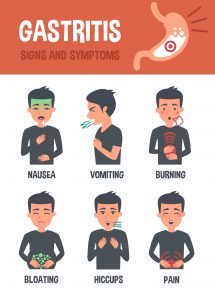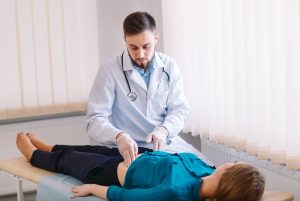Written by Home Doctor Brisbane Team
From the signs, to most importantly, how to treat it!
We’ve all experienced it at some stage or another and it’s safe to say it isn’t very pleasant. That’s right… dreaded gastro. Here’s everything you need to know about the illness, including a few tips to help treatment.
We’ve all experienced it at some stage or another and it’s safe to say it isn’t very pleasant. That’s right…dreaded gastro. Here’s everything you need to know about the illness, including a few tips to help treat the condition.
What is gastro?
Gastroenteritis by its full title, commonly known as gastro, is an illness typically triggered by infections. It causes inflammation and irritation of the interior lining of the gut and intestines.
What are the causes?
Much like other illnesses, there are many causes to gastro including:
- Viruses – the most common viruses causing gastro are norovirus, rotavirus, calicivirus, astrovirus and adenovirus.
- Parasites – such as Entamoeba histolytica, Cryptosporidium and Giardia lamblia.
- Medication – antibiotics, for example, can potentially cause gastro for certain people.
- Bacteria – several types of bacteria, particularly for bacterial gastroenteritis, can be possible causes. Examples include:
- Yersinia, found in pork.
- Staphylococcus, found in dairy products, eggs and meat.
- Salmonella, found in meat, dairy products and eggs.
- coli, found in salads and ground beef.
- Shigella, found in water (for example, swimming pools).
- Campylobacter, found in poultry and meat.
The root cause of gastro, however, is often insufficient hygiene. Whilst you may think your hygiene is up to scratch, there may be some areas you’re not considering. For instance, cooking food in unclean vessels, swallowing unhygienic food, not covering food, not washing hands before cooking or even drinking water which isn’t fresh.
What are the symptoms?
The main symptoms of gastro include:
- Vomiting
- Diarrhoea
- Nausea
- Loss of appetite
- Bloating
- Abdominal cramps and pains
- Fever
- Headaches
- Body aches
- Feeling lethargic.


Are there different types of gastro?
There are two main types – bacterial gastroenteritis and infectious gastroenteritis – but the symptoms are typically the same.
Bacterial gastroenteritis is caused by several types of bacteria, with most being found in food such as meat and dairy products. While infectious gastroenteritis can also be caused by bacteria, it’s often triggered by viruses and parasites as well.
Common types of infectious gastroenteritis include:
Viral gastroenteritis – quite possibly the most known type of infectious gastroenteritis. This infection is spread by person-to-person contact, such as through faeces, vomit, touching contaminated hands, drinking contaminated water and eating contaminated food.
Giardiasis – in simplest terms, giardiasis is a parasite infection of the bowel and is also caused by drinking contaminated water. It can also be contracted by handling infected animals or changing the nappy of an infected baby and failing to wash your hands afterwards.
Cryptosporidium infection – similar to giardiasis, this infection is found in the bowels and is usually caused by drinking contaminated water (for example, swimming in a contaminated pool and accidentally swallowing water) or via infected animals.
Salmonellosis – is bacteria found in animal faeces and is spread by handling infected animals as well as eating contaminated food.
Esherichia coli infection – this infection is a common problem for many people, though in particular for travellers to countries with poor sanitation. It’s usually caused by drinking contaminated water or eating contaminated food (for example, raw fruits and vegetables washed in unsanitary water).
Shigellosis – simply, shigellosis is bacteria found in human faeces and can be spread by an infected person through food or surfaces if they don’t wash their hands after going to the toilet.
Campylobacter infection – the bacteria of campylobacter infection are found in animal faeces and uncooked meat and poultry. While it’s usually caused by consuming contaminated food or water, eating undercooked meat and not washing your hands after touching infected animals can also spread the illness.
When to see a doctor?
You need to seek medical advice if you think you are becoming dehydrated, you’re throwing up a lot and can’t keep fluids down, you have blood in your faeces or vomit, or you have severe stomach pains. A persistent high temperature (fever), or diarrhoea or vomiting that lasts longer than expected, are other reasons to contact your doctor.
Babies under six months old should always be checked by a GP if they have gastro, because they are at higher risk of dehydration. Also, if you’re elderly, have a long-term condition such as diabetes, are pregnant or have trouble with your immune system, don’t hesitate to get in touch with a healthcare professional.
If you are anxious about your own symptoms or someone in your care, it is best to seek a doctor’s advice. If it is late at night or on the weekend, and your GP is closed, you can call 13 55 66 or use the House Call Doctor App to request an after-hours doctor home visit. Our Doctors can advise the best treatment and get you started on medication if necessary. If you require a medical certificate House Call Doctor can provide you with one, allowing you to recover in the comfort of your own home.
How can gastro be diagnosed?
As there are different types of gastro, it’s important to establish which type you may have by proper diagnosis. Methods in which gastro can be diagnosed include:
- Medical history
- Blood tests
- Stool tests
- Physical examination.
Treatment
Treatment depends on the cause, but may include:
- Plenty of fluids
- Oral rehydration drinks, available from your pharmacist
- Admission to hospital and intravenous fluid replacement, in severe cases
- Antibiotics, if bacteria are the cause
- Drugs to kill parasites, if parasites are the cause
- Avoiding anti-vomiting or anti-diarrhoea drugs unless prescribed or recommended by your doctor, because these medications will keep the infection inside your body.
In most cases, fluids and rest are all that is required. Drinks that contain a lot of sugar should be avoided as they can sometimes make diarrhoea worse.


What treatment is available?
If necessary, your doctor will advise specific treatment for gastro depending on the type and severity of your condition. For most cases, gastro infections will resolve within a few days, without antibiotics.
Tips to self-treat gastro include:
- Drinking plenty of fluids
- Oral rehydration drinks (for example, Hydralyte or Gastrolyte)
- Eating small, light meals if possible (such as crackers).
How can gastro be prevented?
There are many general suggestions to avoiding gastro, or reducing its risk, including:
- Washing your hands thoroughly with antibacterial soap, particularly after going to the toilet, changing nappies or handling animals.
- Not handling raw meat with the same utensils (for example, tongs and knives) as cooked food.
- Washing your hands thoroughly before preparing and eating food.
- Regularly cleaning baby change tables.
- Ensuring foods, particularly any meats, are thoroughly cooked.
- If travelling internationally to countries with poor sanitation, only drinking bottled water (and brushing your teeth with bottled water). It’s also important to remember to avoid food buffets, peeled fruits and vegetables, ice in drinks and uncooked foods.
- Keeping all kitchen surfaces clean.
- Cleaning your bathroom and toilet regularly, as well as objects people often touch (for example, door handles and taps).





